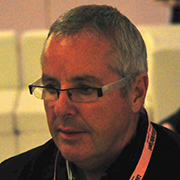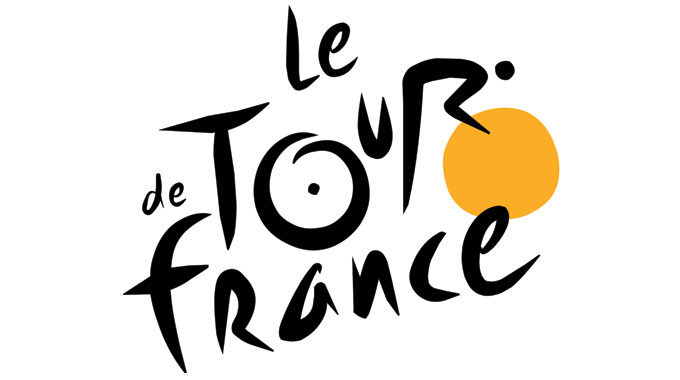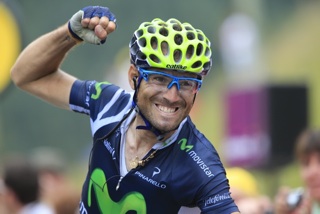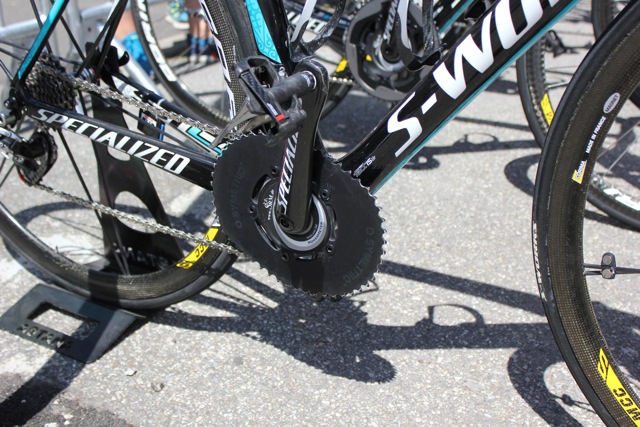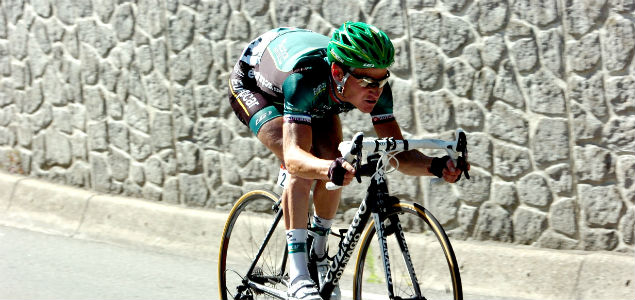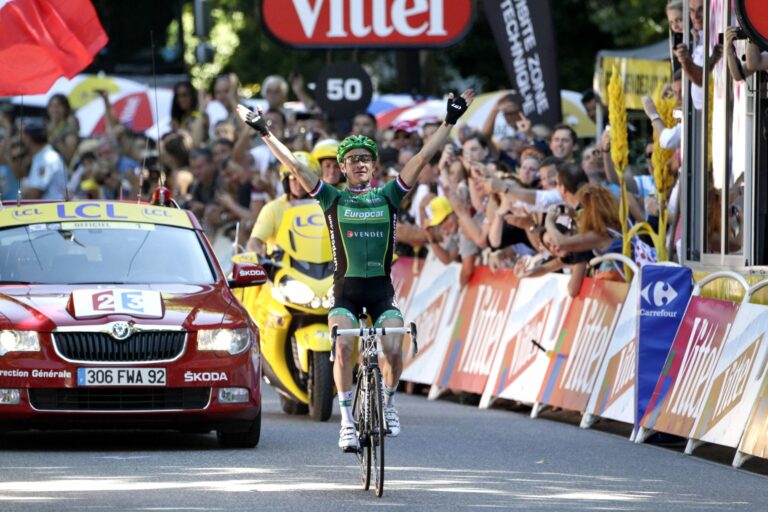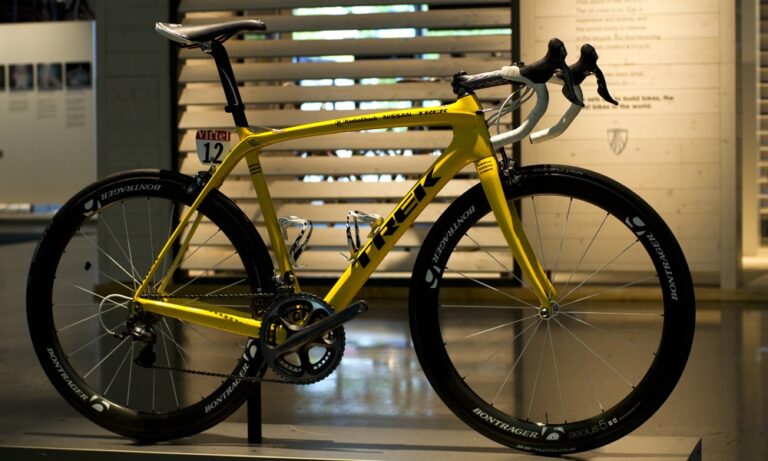A line of people clutching copies of Stephen Roche’s new book, Born To Ride, snakes around the ground floor of London’s Sigma Sport cycle shop and out on to the pavement.
The hundreds who have gathered to have Roche’s signature added to their edition are kept waiting for nearly an hour, but few, if any, seem to mind. Roche is stuck in traffic, being driven from another signing session on the other side of the city. The length and patience of the queue are both measures of the man’s popularity and the enduring stature of his achievement in becoming, some 25 years ago, only the second man to claim cycling’s Triple Crown, winning the Giro d’Italia, Tour de France and World Championships in 1987. He remains, with Eddy Mercx, one of only two men to have done so.

After more than an hour of signing, the shop finally empties, and my promised opportunity to interview Roche arrives. Despite coming at the end of what has obviously been a long and busy day for the Irishman, and with a flight home to the south of France to catch, he is courteous and engaging. It shouldn’t matter (I’m here in a professional capacity, after all) but it does. The man is, after all, responsible for my love of cycling. It was his exploits on the ascent of La Plagne some 25 years ago, a ride I reported with breathless excitement at school the following day to the bewildered indifference of football-obsessed classmates, that first convinced me professional cyclists were a breed apart. His gleaming bicycle, impossibly superior to my own, magnificent red, white, and blue Carrera kit, and superiority among a beguilingly exotic pantheon of seemingly mystical figures named Delgado, Herrera, and Mottet, had me hooked.
I join Roche behind the table from which he has conducted book signing operations and begin a conversation with a cyclist who attained greatness in a peloton littered with talents who would surely have distinguished themselves in any age. Does he feel he raced in a golden era? “Definitely,” he says. Roche offers this year’s Tour de France as evidence. “You can not put down ten guys, five guys that are really capable of winning the Tour this year. Put down Evans and Wiggins and then you’re digging deep to find a third one.” He reels off a list of riders from his generation who were genuine Tour contenders: Kelly, Delgado, Fignon, Mottet, Bernard, Herrera… He pauses before placing himself in the shoes of the cycling fan of the 1980s, evaluating the strengths and weaknesses of an elite group who could realistically fight for victory in cycling’s greatest race. “There were genuinely half a dozen guys there capable of winning, which kind of held it in suspense,” he says.
Our conversation comes at the end of a week in which the list of contenders for this year’s Tour, already weakened by the absence of Alberto Contador, has received another blow with the announcement days earlier that Andy Schleck has fractured his pelvis and will miss the race. How significant will the Luxembourger’s absence prove? “Firstly, because there is so much time trialing in this year’s Tour, it was going to be complicated for Andy Schleck; also the fact that there are only two mountain top finishes wasn’t very good for him,” says Roche. Some 107km of time trialing would have given Schleck a handicap of nearly 10 minutes, he surmises; a disadvantage hard to overcome for a pure climber offered just two summit finishes.
But Roche is not pessimistic about this year’s Tour. The absence of some of the biggest names will encourage those who had targeted a top 10 finish to reevaluate their goals and aim for the top five. Who does he place among that group? Valverde? Yes, Valverde. “And why not a Voeckler?” he adds. “Voeckler is an opportunist.” Good all-rounders with the chance of gaining up to five minutes in a single day could be dangerous, he reasons. “There are going to be a lot of riders out there who are going to be looking at the race in detail at the moment because of all of sudden that chance of finishing in the top five is real.”
Bradley Wiggins’ preparation for his biggest goal could scarcely have gone better with victories at Paris-Nice, the Tour de Romandie, and, most recently, the Critérium du Dauphiné. But Roche cautions against overlooking defending champion, Cadel Evans, while acknowledging that the Australian faces a “complicated” first week. “He knows that in the time trials it’s going to be difficult to beat Wiggins. In the mountains, it’s going to be difficult to beat Wiggins as well: drop him a little bit, but gain two minutes? No.”
I suggest that Wiggins’ teammate, Chris Froome, may reprise the role of super domestique performed by Miguel Indurain in Pedro Delgado’s 1988 Tour victory, a year after Roche’s, while the Irishman was battling crippling knee problems. Roche concurs. “Super domestique and ‘plan B’, maybe,” he suggests, providing Froome works his way back to the form he displayed at last year’s Vuelta a Espana, where he finished second overall. “He can be very dangerous; he can time trial, he can climb. He can be a very, very good hand to play for Sky.”
Born to Ride has been well received. The size of the crowd gathered at Sigma Sport tells its own story. Roche has come from a signing session at the new Westfield shopping centre next to the Olympic park in Stratford, the latest in an extensive round of personal appearances to promote the book. The Agony and the Ecstasy was the most cherished of my Christmas presents 25 years ago. So why another book? And why now?
Roche admits to having had no thoughts of writing a book, but after encouragement from Sven at HotChilli events, organisers of the London to Paris ride Roche is endorsing, began committing thoughts to tape for ghost writer, Peter Cossins. He is glad he did. He says he enjoyed the process “immensely”, a new development for a rider who says he had looked forward throughout his career, never allowing himself the luxury of reflecting on his achievements.

Cycling’s new influx from those encouraged to take up the sport by the Cycle to Work Scheme and sportives, aware of the achievements of Cavendish and Wiggins are now hungry for knowledge of the heroes of the past, he reasons. Have his achievements, and those of countryman, Sean Kelly, greater than either of the aforementioned, been overlooked? “Maybe not overlooked, but maybe the UK and Ireland weren’t ready to embrace it,” he says.
The public at large were receptive, he continues, and English-speaking riders like Robert Millar, Sean Yates, Paul Sherwen, and Graham Jones played their part, but the sport’s federations in both the UK and Ireland perhaps didn’t do enough to develop the sport. He cites Team Sky’s entry to this year’s Tour with two contenders for GC, as well as the world road race champion, as evidence of the wealth of natural talent at the disposal of the Anglo-Irish federations.
“When Brailsford formed Sky three years ago, he said very seriously, ‘We’re going to have a British winner of the Tour de France within five years’ and everybody asked, ‘what sort of a golden ball is he looking in to?’ And now three years on, he has one, possibly two, and Cavendish. How times have changed.”
Portrait of Stephen Roche by Roz Jones, On The Road Cycling Tours

